Super Bowl XVII - Washington Redskins vs Miami Dolphins: Pregame
The 1982 NFL season was an unusual one.
The Washington Redskins were in Year Two of a rebuilding program under new coach Joe Gibbs.
- Under Gibbs, the Redskins had improved from 6-10 in 1980 under Jack Pardee to 8-8 in 1981.
Fans were not happy when their Skins began the '81 season 0-5. Some wore bags over their heads to the next home game in imitation of what Saints fans had done the year before. But Gibbs had a "come to Jesus meeting" with QB Joe Theismann, who had thrown nine INTs in the first five games. Gibbs accused Joe of being too distracted by non-football activities. When the quarterback, who was almost traded to Detroit, started playing better and handing the ball to John Riggins more often, the Redskins won five of their next six.
- The '82 Skins had won both their games before the strike began.
Theismann organized team workouts during the strike. The receivers and defensive backs did seven-on-seven skeleton patterns. That helped Washington immensely when play resumed. T Joe Jacoby recalled, "All the Redskins players hung together as a group during those weeks we were out, and there wasn't much bitching and complaining. The relationships that formed paid off for us when the season resumed."
- After the strike, they won six of their first seven games, the only loss coming at home to the Cowboys 24-10. It was the sixth straight win for Dallas over the Redskins.
- Their 8-1 record gave the Redskins the #1 seed for the NFC playoffs.
- The Cowboys were the #2 seed with a 6-3 record and, like the Skins, would host the first two rounds of the playoff.
Both teams won their two playoff games at home to set up another meeting for the NFC Championship.
- Washington defeated the Detroit Lions 31-7 and the Minnesota Vikings 21-7.
- Dallas didn't have as easy a task. They beat the Tampa Bay Buccaneers 30-17 and the Green Bay Packers 37-26.
Gibbs and new GM Bobby Beathard had transformed the Redskins from a team that had valued veterans since the regime of George Allen that was continued by his successor, Pardee, into a team that drafted gifted young players.
- Gibbs had served as offensive coordinator under Don Coryell with the Chargers. Coryell, the inventor of the I formation, had gained fame for his innovative passing offense at San Diego.
- Joe had also served under John McKay at both USC and Tampa Bay. McKay, having learned the I formation from Coryell, turned the Trojans into one of top rushing teams annually. (Think Mike Garrett and OJ Simpson.)
- The new offensive line coach was Joe Bugel, who had transformed the Houston Oilers' running game into the best in the NFL. (Think Earl Campbell.) Bugel created a group of giants who reveled in the name "Hogs."
T George Starke explained the origin of the term. "It started that year in camp when coach Bugel looked at Russ Grimm one day in drills and told him he looked like a hog, just big and kind of wallowing around in the dirt. A couple days later, coach came out with T-shirts for us that had 'Hogs' on them. Then it was caps. I guess camp's as boring for the press as it is for players because they started writing about the Hogs."
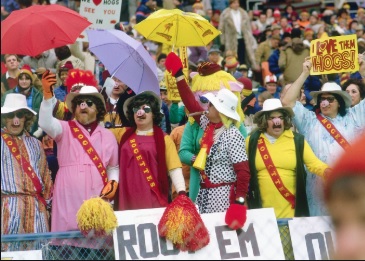 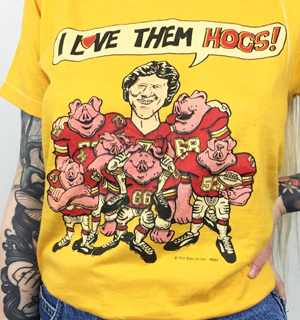
The first task Gibbs set for himself after taking over the Redskins was the re-signing of RB John Riggins.
- After gaining 1,153y in 1979, Riggins left the Redskins 1980 training camp when the club refused to renegotiate his contract. He sat out the entire season.
- Eleven months later, Gibbs talked him into returning and made him the centerpiece of the offense.
- Riggins gained only 714y rushing in '81 as the Redskins started with five losses but won seven of their last nine games to finish 8-8.
- "The Diesel," as John was called, gained 553y in eight games in '82.
As the final minutes ticked away in the Redskins' semifinal victory over Minnesota, the fans started chanting, "We want Dallas. We Want Dallas." When the Cowboys beat the Packers the next day, the fans got their wish.
- Riggins ran the ball an astounding 36 times for 140y to help the Redskins lead in time of possession by five minutes.
- More important, Washington won on the scoreboard 31-17.
- Read about the 1982 NFC Championship Game.
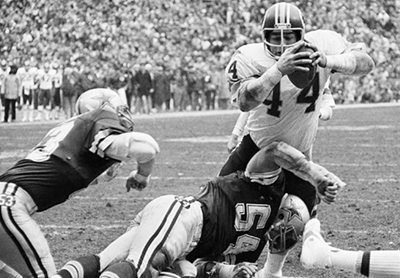
John Riggins scores against the Cowboys in the NFC Championship Game.
The AFC saw the resurgence of a franchise that had not won a playoff game since 1974.
- Miami Dolphins coach Don Shula had become a head coach at age 33, taking the Baltimore Colts to the NFL Championship game in his second year. His '68 Colts won the NFL title only to suffer the humiliating loss to the New York Jets in Super Bowl III.
- Shula moved to Miami a year later and led the Dolphins to the Super Bowl in 1971, losing to the Cowboys. But the next year Miami had the greatest season in NFL history - 17-0. The Dolphins lost two games in 1973 but won the Super Bowl again over the Minnesota Vikings.
- Miami made the playoffs only four times in the next eight years and lost in the first round each time.
- By his own admission, the young firebrand who screamed at players and officials had mellowed. "As a younger coach, I was very intense," said Shula in his 20th year as a head coach. "Sometimes I was less than understanding. I hope I have been able to balance it out a little, but I also hope that I never give up being intense."
The last holdover from the undefeated 1972 Dolphins, G Bob Kuechenberg, said, "Don has changed a little. Our society has changed. I think of Vince Lombardi, one of the greatest all-time coaches, very rigid, very demanding. There are times when I would go through a brick wall, but Don Shula has transcended that era of asking a player to go through a brick wall without asking questions. Coach Shula is more relaxed now. He's enjoying the hunt. He still wants to win, but he's able to smile and crack a joke."
The '82 Dolphins went 7-2 in the irregular season, winning their last three games to make the expanded playoffs as a wild card.
- Fortunate to host all three playoff games, Miami beat the Patriots 28-13 and the Chargers 34-13 to reach the AFC title game. A big reason for the Dolphins' success in those two games was the outstanding play of QB David Woodley.
- Their opponent for the third time were the New York Jets, whom the Dolphins had beaten 45-28 and 20-19 in AFC East play. The faster Jets were at a disadvantage in what was dubbed the "Mud Bowl," and lost 14-0. Miami LB A. J. Duhe's three interceptions, including one he returned for the clinching touchdown, led the "Killer Bees" defense that held the potent New York offense to just 10 first downs and only 139 total yards.
"Killer Bees" came from the fact that the names of six starters on Defensive Coordinator Bill Arnsparger's defense started with the letter B: NT Bob Baumhower, DE Doug Betters, SS Glenn Blackwood, FS Lyle Blackwood, DE Kim Bokamper, and LB Bob Brudzinski.
A. J. Duhe recalled how the Dolphins handled the strike layoff. "For us as a unit, we kind of hung together as one of the closest-knit teams during that strike seson. We stayed fresh, and we stayed current. We knew what had to get done and how to stay in shape. I think that had a big impact on us being successful."
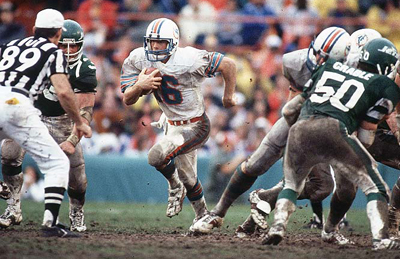
David Woodley breaks loose in the "Mud Bowl" vs the Jets. Like the Redskins, the Dolphins bore the stamp of Bobby Beathard, who had been Miami's talent-hunter from 1972-77.
Because of the strike, an extra week was added to the regular season.
- That reduced the usual two-week period before the Super Bowl to one.
- So the two teams had to enplane to Los Angeles the day after their championship games for the big battle in the Rose Bowl.
The Redskins had to put the great victory over Dallas behind them and focus on Miami.
- Theismann recalled how he rode the momentum from the victory over the Cowboys to the Super Bowl. "That game (against Dallas) was bigger than life. To be able to win that was great. The whole environment was just riveting. Then we only had one week to get ready for the Super Bowl. We're riding the crest of this wave, and let's ride this sucker right out to California."
- But other Redskins had to fight a letdown. DL Dexter Manley: "The victory over the Cowboys was our Super Bowl. It was a great rivalry for the league."
- Coach Gibbs expressed similar sentiments to the press after the NFC title victory. "This was the way it was supposed to be. I haven't even thought about the Super Bowl. This is our Super Bowl; this was everything rolled into one. The Redskins versus Dallas, the team we wanted to beat the most. How can you top that?"
- The absence of a bye week may have helped the Redskins get refocused in a hurry. In addition to the usual hassle of travel arrangements, obtaining tickets for family and friends, acceding to media requests and public appearance, the game plan had to be installed quickly."I think this is good for the team," said RB Joe Washington midweek in Pasadena. "If you needed to get pinched about being at the Super Bowl, this will pinch you.It will get your mind off Dallas and onto this week."
- "It really wasn't hard," said Theismann. "The Super Bowl is the Super Bowl. It's the game that every person points to. You don't sit around as a kid saying, 'Gosh, I hope I get to play in an NFC Championship game."
Each team came to the same conclusion about the Washington offense.
- Miami DE Bokamper on the Redskins, "We knew they were going to try and run the football. They had a great offensive line, and we knew Riggins was going to be the guy who would get a lot of carries, but we were pretty confident. We played the Jets the week before and shut them out in the AFC Championship game. We felt pretty good about what we could do defensively."
- Theismann, who finished with the highest passer rating in the NFL, recalled: "We weren't going to be able to just drop back and throw the football on a repeated basis. They were just too good, too fast, and too quick. Bill Arnsparger is one of the greatest defensive coaches in the history of football, and he had the players. We felt like we had to run the football."
Theismann was drafted by the Dolphins out of Notre Dame in 1970 and agreed to terms with the club. Then he jumped out of his agreement and signed with the Toronto Argonauts for $50,000. When asked about it, Shula replied, "He went on TV in Miami to say he was glad he was a Dolphin. Then the contract never came back. I went to South Bend to find him, and he said it was all set. Then two days later, he announced he had signed with Canada. I was ticked off at the time. He didn't honor his commitment."
Told what Shula said, Theismann admitted, "I remember my infamous statement, 'Come hell or high water, I'll be a Miami Dolphin.' I made a mistake. I made a mess. I did it myself. It was a very regretful experience. I embarrassed them, and I embarrassed myself."
Three years later, Joe wanted to return to the States but not to Miami. So Shula traded him to George Allen's "Over the Hill Gang" in Washington for a #1 draft choice.
Theismann spent four years with the Redskins backing up veterans Sonny Jurgensen and Billy Kilmer.
Miami's biggest concern was its passing game, which ranked last in the NFL for the regular season. Which David Woodley would show up for the Super Bowl?
- The one who completed only 54.8% of his passes in the nine regular season games with just five touchdowns against eight interceptions?
- Or the one who connected on 33-of-41 passes (80.5%) in the three playoff games for 441y and four TDs with only one interception?
The player who attracted the most media attention was John Riggins.
- He had ended his yearlong silence with the media right after the NFC championship game.
- Riggins admitted that, after the strike ended, he was so mentally drained that he considered retiring again. "I was ready to pack my bags and head for Kansas. Boy, what a mistake that would have been." He added, "I've waited a long time for this."
- With Gibbs setting no curfew, Riggins led a group of Redskins in an exploration of the Los Angeles nightlife Tuesday evening. "We hit the town and got in about three o'clock," said Russ Grimm. "We drank a few beers, had a few shots here and there. We weren't staggering drunk, but we had a little buzz on." When they got back to the hotel, they delivered early wakeup calls to their teammates.
T Joe Jacoby, one of the Hogs, recalled, "We did have our fun, but we were disciplined enough not to gt into trouble. After that we got down to business. We had great practices. Joe Gibbs's philosophy was that you practice full tilt Wednesday, Thursday, and Friday, so you don't have any shocks on Sunday. The onl thing we didn't do was tackle, but we went full go until the whistle and we had some hellacious practices. It got so intense that Joe was afraid we were going to hurt each other. He had to slow us down because he was worried about our emotional state. But we were in the right frame of mind; we were ready to play."
Gibbs said after the game, "We had had good practices. I wanted everything to be just like it would have been had we been home. I told our players, 'If you go out to eat at home, go out to eat. If you go to bed at 11, go to bed then. But get your priorities in order."
- A female reporter asked Big John, "How will you deal with the Miami linebackers?" He folded his "tree trunk arms" across his chest and answered, "Won't. I shouldn't have to deal with those linebackers if the Hogs do their job. Hogs do what they're supposed to do, I ought to get on through to those defensive backs ... That's who I should have to deal with. And they're quite a bit smaller."
Washington owner Jack Kent Cooke staged a Friday night team party. The 350 guests were told to dress casual. But Riggins paid no attention to that, arriving wearing a top hat, tuxedo, white tie, white vest, and white gloves. "I wouldn't call [my behavior] crazy," he told a reporter. "I'm just expressing myself. I like to do what I like to do at the moment. I'm spontaneous, but I like to think I'm always in control of the situation."
Because of the Killer Bees and their 12 playoff interceptions, the Dolphins were favored by 1 1/2 to 3 points. A game that featured the teams that allowed the fewest and second fewest points in the league ( Washington and Miami in that order) was expected to be low scoring.
NBC televised the big game, which would draw an estimated 81.7 million viewers.
- Dick Enberg did the play-by-play with Merlin Olsen supplying the commentary.
- Jack Buck and Hank Stram handled the CBS radio broadcast.
Leslie Easterbrook sang the National Anthem, and former Ram great Elroy Hirsch performed the opening coin toss.
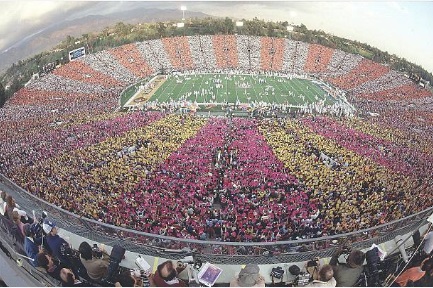
Rose Bowl panorama before the game.
|
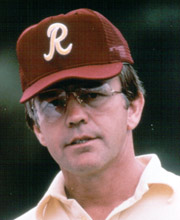
Joe Gibbs
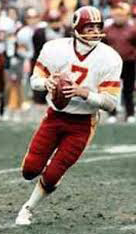
Joe Theismann
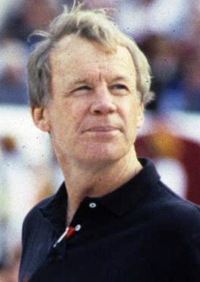
Bobby Beathard
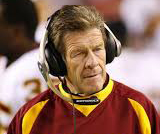
Joe Bugel
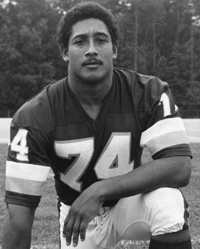
George Starke
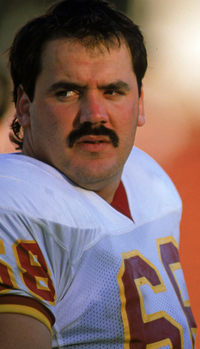
Russ Grimm
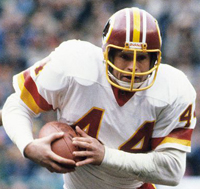
John Riggins
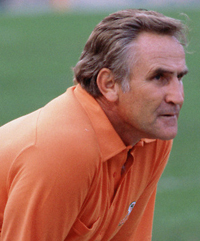
Don Shula
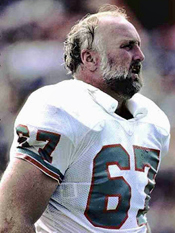
Bob Kuechenberg
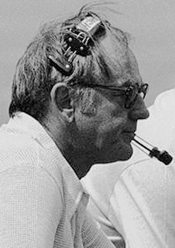
Bill Arnsparger
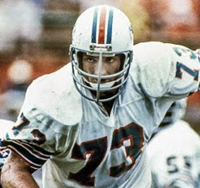
Bob Baumhower
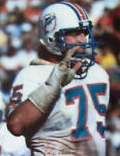
Doug Betters
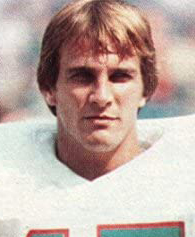
Glenn Blackwood
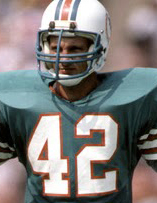
Lyle Blackwood
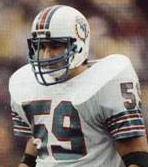
Bob Brudzinski
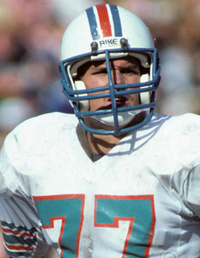
A. J. Duhe
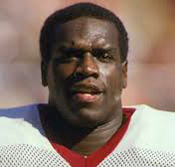
Dexter Manley
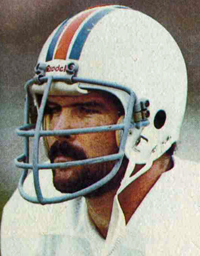
Kim Bokamper
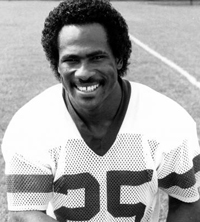
Joe Washington
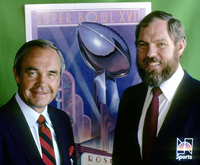
Dick Enberg and Merlin Olsen
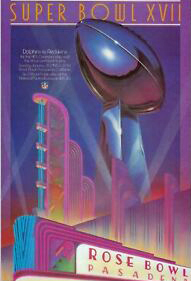
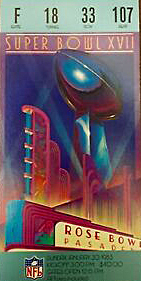
|
1982 Washington Redskins
| # |
Player |
Pos. |
Hgt. |
Wgt. |
College |
Exp. |
| 3 |
Mark Moseley |
K |
5-11 |
200 |
Texas A&M/S.F.Austin |
13 |
| 5 |
Jeff Hayes |
P |
5-11 |
175 |
North Carolina |
1 |
| 7 |
Joe Theismann |
QB |
6-0 |
200 |
Notre Dame |
9 |
| 20 |
Joe Lavender |
CB |
6-4 |
190 |
San Diego State |
10 |
| 21 |
Mike Nelms |
S |
6-1 |
190 |
Sam Hous. St./Baylor |
3 |
| 22 |
Curtis Jordan |
S |
6-2 |
200 |
Texas Tech |
7 |
| 23 |
Tony Peters |
SS |
6-1 |
190 |
Oklahoma |
8 |
| 25 |
Joe Washington |
RB |
5-10 |
180 |
Oklahoma |
6 |
| 29 |
Mark Murphy |
FS |
6-3 |
210 |
Colgate |
6 |
| 30 |
Nick Giaquinto |
RB |
5-11 |
205 |
Bridgeport/Connecticut |
3 |
| 32 |
Vernon Dean |
CB |
5-11 |
180 |
US Int'l, San Diego St. |
1 |
| 38 |
Clarence Harmon |
RB |
5-11 |
205 |
Mississippi State |
6 |
| 39 |
Otis Wonsley |
RB |
5-10 |
215 |
Alcorn State |
2 |
| 40 |
Wilbur Jackson |
RB |
6-1 |
215 |
Alabama |
9 |
| 44 |
John Riggins |
RB |
6-2 |
250 |
Kansas |
12 |
| 45 |
Jeris White |
CB |
5-10 |
190 |
Hawaii |
9 |
| 46 |
LeCharls McDaniel |
CB |
5-9 |
185 |
Cal Poly-San Luis Obispo |
2 |
| 47 |
Greg Williams |
S |
5-11 |
185 |
Mississippi State |
1 |
| 50 |
Larry Kubin |
LB |
6-2 |
235 |
Penn State |
1 |
| 51 |
Monte Coleman |
LB |
6-2 |
240 |
Central Arkansas |
4 |
| 52 |
Neal Olkewicz |
LB |
6-0 |
230 |
Maryland |
4 |
| 53 |
Jeff Bostic |
C |
6-2 |
245 |
Clemson |
3 |
| 54 |
Pete Cronan |
LB |
6-2 |
240 |
Boston College |
6 |
| 55 |
Mel Kaufman |
LB |
6-2 |
220 |
Cal Poly-San Luis Obispo |
2 |
| 56 |
Quentin Lowry |
LB |
6-2 |
230 |
Youngstown State |
2 |
| 57 |
Rich Milot |
LB |
6-4 |
235 |
Penn State |
4 |
| 62 |
Donald Laster |
G |
6-5 |
285 |
Tennessee State |
1 |
| 63 |
Fred Dean |
G |
6-3 |
255 |
Texas Southern |
6 |
| 65 |
Dave Butz |
NT |
6-7 |
295 |
Purdue |
10 |
| 66 |
Joe Jacoby |
T |
6-7 |
295 |
Louisville |
2 |
| 68 |
Russ Grimm |
G |
6-3 |
275 |
Pittsburgh |
2 |
| 69 |
Perry Brooks |
DT |
6-3 |
265 |
Southern |
5 |
| 71 |
Garry Puetz |
T |
6-3 |
265 |
Valparaiso |
10 |
| 72 |
Dexter Manley |
DE |
6-3 |
240 |
Oklahoma State |
2 |
| 73 |
Mark May |
G |
6-6 |
295 |
Pittsburgh |
2 |
| 74 |
George Starke |
T |
6-5 |
260 |
Columbia |
10 |
| 76 |
Mat Mendenhall |
DE |
6-6 |
255 |
BYU |
2 |
| 77 |
Darryl Grant |
DE |
6-2 |
265 |
Rice |
2 |
| 78 |
Tony McGee |
DE |
6-4 |
250 |
Wyoming/Bishop |
12 |
| 79 |
Todd Liebenstein |
DE |
6-6 |
255 |
UNLV |
1 |
| 80 |
Virgil Seay |
WR |
5-8 |
175 |
Troy |
2 |
| 82 |
Rich Caster |
TE |
6-5 |
230 |
Jackson State |
13 |
| 85 |
Don Warren |
TE |
6-4 |
245 |
San Diego State |
4 |
| 86 |
Clint Didier |
TE |
6-5 |
240 |
Portland State |
1 |
| 87 |
Charlie Brown |
WR |
5-10 |
180 |
South Carolina State |
1 |
| 88 |
Rick Walker |
TE |
6-4 |
235 |
UCLA |
6 |
| 89 |
Alvin Garrett |
WR |
5-7 |
180 |
Angelo State |
3 |
|
1982 Miami Dolphins
| # |
Player |
Pos. |
Hgt. |
Wgt. |
College |
Exp. |
| 3 |
Tom Orosz |
P |
6-1 |
205 |
Ohio State |
2 |
| 5 |
Uwe Von Schamann |
K |
6-0 |
190 |
Oklahoma |
4 |
| 10 |
Don Strock |
QB |
6-5 |
220 |
Virginia Tech |
9 |
| 11 |
Jim Jensen |
QB |
6-4 |
215 |
Boston U. |
2 |
| 16 |
David Woodley |
QB |
6-2 |
205 |
LSU |
3 |
| 22 |
Tony Nathan |
RB |
6-0 |
205 |
Alabama |
4 |
| 28 |
Don McNeal |
CB |
5-11 |
190 |
Alabama |
3 |
| 31 |
Eddie Hill |
RB |
6-2 |
205 |
Memphis |
4 |
| 32 |
Tom Vigorito |
RB |
5-10 |
195 |
Virginia |
2 |
| 33 |
Rich Diana |
RB |
5-9 |
220 |
Yale |
1 |
| 34 |
Woody Bennett |
RB |
6-2 |
225 |
Miami (FL) |
4 |
| 37 |
Andra Franklin |
RB |
5-10 |
225 |
Nebraska |
2 |
| 40 |
Mike Kozlowski |
S |
6-0 |
195 |
San Diego St./BYU/Col. |
4 |
| 41 |
Fulton Walker |
CB |
5-10 |
195 |
West Virginia |
2 |
| 42 |
Lyle Blackwood |
FS |
6-1 |
190 |
TCU |
10 |
| 44 |
Paul Lankford |
CB |
6-1 |
185 |
Penn State |
1 |
| 47 |
Glenn Blackwood |
SS |
6-0 |
185 |
Texas |
4 |
| 48 |
Gerald Small |
CB |
5-11 |
190 |
San Jose State |
5 |
| 49 |
William Judson |
CB |
6-1 |
190 |
South Carolina State |
1 |
| 50 |
Larry Gordon |
LB |
6-4 |
230 |
Arizona State |
7 |
| 52 |
Steve Shull |
LB |
6-1 |
220 |
William & Mary |
3 |
| 53 |
Ron Hester |
LB |
6-2 |
220 |
Florida State |
1 |
| 54 |
Steve Potter |
LB |
6-3 |
235 |
Virginia |
2 |
| 55 |
Ernest Rhone |
LB |
6-2 |
225 |
Henderson State |
8 |
| 56 |
Charles Bowser |
LB |
6-3 |
230 |
Duke |
1 |
| 57 |
Dwight Stephenson |
C |
6-2 |
255 |
Alabama |
3 |
| 58 |
Kim Bokamper |
DE |
6-6 |
250 |
Concordia/San Jose St. |
6 |
| 59 |
Bob Brudzinski |
LB |
6-4 |
230 |
Ohio State |
6 |
| 60 |
Jeff Toews |
G |
6-3 |
255 |
Washington |
4 |
| 61 |
Roy Foster |
G |
6-4 |
280 |
USC |
1 |
| 63 |
Mark Dennard |
C |
6-1 |
255 |
Texas A&M |
4 |
| 67 |
Bob Kuechenberg |
G |
6-2 |
255 |
Notre Dame |
13 |
| 68 |
Eric Laakso |
T |
6-4 |
265 |
Tulane |
5 |
| 73 |
Bob Baumhower |
NT |
6-5 |
260 |
Alabama |
6 |
| 74 |
Cleveland Green |
T |
6-3 |
265 |
Southern |
4 |
| 75 |
Doug Betters |
DE |
6-7 |
260 |
Montana/Nevada |
5 |
| 77 |
A. J. Duhe |
LB |
6-4 |
250 |
LSU |
6 |
| 79 |
Jon Giesler |
T |
6-5 |
260 |
Michigan |
4 |
| 80 |
Joe Rose |
TE |
6-3 |
230 |
California |
3 |
| 81 |
Jimmy Cefalo |
WR |
5-11 |
190 |
Penn State |
5 |
| 82 |
Duriel Harris |
WR |
5-11 |
175 |
New Mexico State |
7 |
| 83 |
Vern Den Herder |
DE |
6-6 |
250 |
Central College (IA) |
12 |
| 84 |
Bruce Hardy |
TE |
6-4 |
230 |
Arizona State |
5 |
| 86 |
Ronnie Lee |
TE |
6-3 |
265 |
Baylor |
4 |
| 88 |
Vince Heflin |
WR |
6-0 |
185 |
Central State (OH) |
1 |
| 89 |
Nat Moore |
WR |
5-9 |
185 |
Tenn-Martin/Florida |
9 |
|
References: The Super Bowl: Celebrating a Quarter-Century of America's Greatest Game (1990)
Super Bowl Chronicles: A Sportswriter Reflects on the First 30 Years of America's Game, Jerry Green (1995)
Super Bowl: The Game of Their Lives, Danny Peary (ed.) (1997)
The Football Game I'll Never Forget: 100 NFL Stars' Stories, selected by Chris McDonell (2004)
The Ultimate Super Bowl Book, Bob McGinn (2009)
50 Years, 50 Moments: The Most Unforgettable Plays in Super Bowl History, Jerry Rice and Randy O. Williams (2015)
Super Bowl Gold: 50 Years of the Big Game, Sports Illustrated (2015)
The Super Bowl: The First Fifty Years of America's Greatest Game, David Fischer (2015)
Hail to the Redskins: Gibbs, the Diesel, the Hogs, and the Glory Days of D.C.'s Football Dynasty, Adam Lazarus (2015)
The First 50 Super Bowls: How Football's Championships Were Won, Ed Benkin (2018)
Don Shula: A Biography of the Winningest Coach in NFL History, Carlo DeVito (2018)
|
|


























